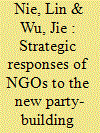| Srl | Item |
| 1 |
ID:
134180


|
|
|
|
|
| Publication |
2014.
|
| Summary/Abstract |
In this paper, we argue that the two Koreas' intentions and actions on the cyber front point toward the possibility that they have engaged in cyber warfare against each other. From South Korea's standpoint, a key concern has been North Korea's advanced cyber warfare capabilities and alleged involvement of its substantial workforce in the Internet's dark side activities. These issues need to be looked at the backdrop of the North's nuclear and ballistic missile capabilities. This paper draws principally upon theories and concepts from military strategy and warfare to examine the contexts, mechanisms, and processes associated with the cyber warfare in the Korean peninsula. We also compare the two Koreas in terms of various forms of asymmetries in cyber warfare and cyber attacks. Also highlighted in the paper are South Korea's recent initiatives and actions to enhance cyber-offense and cyber-defense capabilities.
|
|
|
|
|
|
|
|
|
|
|
|
|
|
|
|
| 2 |
ID:
184087


|
|
|
|
|
| Summary/Abstract |
Over the last decade, the Chinese Communist Party (CCP) has sought to assimilate the third sector – non-governmental organizations (NGOs) – through its party-building campaign. This article examines NGOs’ strategies in response to this campaign, based on in-depth interviews with 64 NGOs and local cadres. We find that NGOs have developed three main strategies to respond to the CCP’s attempts to penetrate their organizations. First, NGOs embedded in the party-state system and those affiliated with private enterprises tend to acquiesce to party building out of habit and for compliance reasons, respectively. Second, those with multiple stakeholders generally compromise in the party-building process, acting as passive compliers if they depend more on non-state resources, or active players if they rely more on state resources. Third, civic NGOs that advocate causes inconsistent with the ruling regime might avoid party building as a resistant strategy, by either disguising their nonconformity or escaping from the control of the ruling regime entirely. NGOs’ strategic responses are contingent on their negotiating power, which results from their resource dependence and the party’s enforcement dilemmas. This article contributes to our understanding of the recent party-building campaign from an institutional perspective, and enriches our knowledge about relations between the party and the third sector.
|
|
|
|
|
|
|
|
|
|
|
|
|
|
|
|